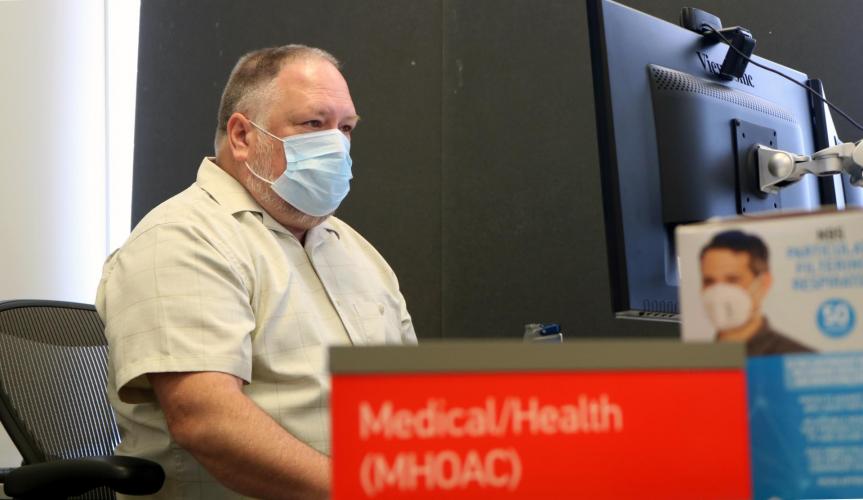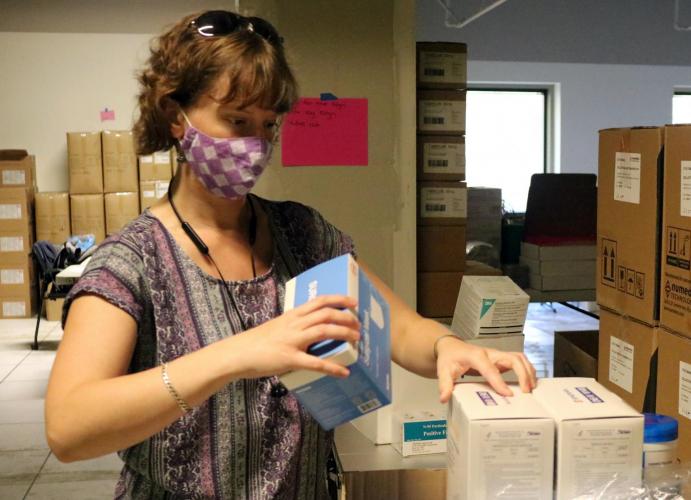Marin County Heroes Perform Life-Saving Pandemic Services
This guest blog post from Marin County is part of a series highlighting California County excellence in responding to the COVID-19 pandemic. To submit your County story, contact Sara Floor.
San Rafael, CA — On Easter Sunday 2020, Troy Peterson’s phone rang right before the big family meal. A long-term care facility in Marin County reported a rash of COVID-19 cases among its staff and fragile residents, and there weren’t enough staff showing up for work.
It was the type of emergency for which Peterson had trained for more than two decades. A former paramedic and ambulance company supervisor, Peterson is the most experienced member of Marin County’s Medical Health Operational Area Coordinator (MHOAC) team, known as MOW-ock.
Peterson remembered a news story from a few days earlier about a similar facility another location where 84 residents at a 90-bed rehabilitation center had to be evacuated when employees stopped caring for the patients. For two full days.
“There are times in a job like mine when you’re sitting down for dinner and you get the call, then three hours later you finally get to eat,” Peterson said months later. “We just had to respond to this right away.”
During an Emergency Operations Center (EOC) activation – which is set up by the County of Marin whenever any type of disaster is imminent or has occurred – the MHOAC team is the medical supplies wing responsible for monitoring, ensuring, and procuring medical and health resources. Most of those who get the call to work in the EOC abandon their regular jobs in the County’s various departments and focus on the emergency. Only a few specialists like Peterson do full-time work on emergency preparedness, planning, and training. Marin County’s EOC has been going full bore since it was activated March 4, 2020.
The heart of Marin’s MHOAC program is Peterson, his cohort Troy Mead, Allison Nygaard from Public Health Preparedness, temporary assistant Cristin Seppa, and Emergency Medical Services Agency office assistant Liria Topuz. They work together to track down and provide personal protective gear and other medical /health supplies to public health personnel, first responders, and other health care providers during an emergency.
That Easter, the MHOAC crew worked the phones to locate additional staff and provided personal protective equipment (PPE) so the care facility staffers who were not infected could safely serve the residents. One of MHOAC’s toughest tasks is to collectively decide with Marin County Public Health officials who gets what.
Peterson said he remembers one pandemic planning session years ago when the exercise included the dilemma about who was going to get a vaccine first during a pandemic.
“Well, it’s first responders first, right?” he said. “But what about the doctors, the nurses, the emergency room technicians, the skilled nursing facility staff? What about drivers delivering the meals to seniors who can’t get out? That’s when we first started thinking about expanding the concept of what a first responder is.”
At the start of the COVID-19 emergency, the MHOAC team quickly concluded that their stash of supplies did not match the disaster at hand: a contagious public health pandemic. In late March, Priority No. 1 was to update the inventory, label items that didn’t match the needs, and create a new shopping list. After inspecting every corner of every storage room, the team found that some one-time grant-funded supplies were more than 10 years old. Every other EOC around the world was doing the same thing and discovering “use before” dates were ancient history, so it was a race to get new orders in for PPE.
“Initially when we went through an urgent PPE shortage, we kept in mind that it was our job to support the people doing the patient-care work,” Peterson said. “We just have to deliver. I’m glad we pulled out of it, but that was probably our biggest challenge through this whole thing.”
Peterson convened a policy group of representatives from different EOC sections to help make those tough and potentially life-saving decisions about how to distribute the most in-demand supplies. Seppa, a Santa Rosa resident, ended up being the point person for taking and filling the PPE orders.
Normally, Seppa works as an extra-hire employee for the Department of Cultural Services and the nonprofit Marin Cultural Association. In a non-pandemic year, she would spend January through July preparing the exhibits and contests for the Marin County Fair. Although she grew up on Lake Tahoe’s south shore, both her parents have deep roots in Marin County, and the fair has been part of her life since she was a young kid.
Since the fair was canceled in 2020 (and 2021 as well), Seppa has worked closely with the two Troys as a disaster service worker, or DSW, out of the Emergency Operations Center in northern San Rafael. Putting her St. Mary’s College degree in health sciences to good use, she has handled resource requests from health care providers, long-term care facilities, and first-responder organizations, and helped make the tough decisions about how to fairly distribute much-needed supplies. She has seen recipients get moved to tears because of the MHOAC’s efforts to obtain and distribute equipment so those on the front lines can do their jobs safely.
“I’m lucky that in my role of support for those teams, I get to be the one who works face to face with the recipients, and I get the thank-yous,” Seppa said. “All the good feelings pass through me and up to the rest of the EOC team. There are few things in COVID times that are good for mental health, but that’s been in a round-about way, really heartwarming for me. The community has been very resilient and appreciative, which is really nice to see.”
Calling her a “workhorse,” Peterson said Seppa’s organizational skills have been timely and vital to MHOAC’s efficiency. She designed a new inventory tracking system to replace one that wasn’t working well and mastered the Tetris game of warehouse storage.
“The impact she has made is pretty amazing,” Peterson said. “She is so valuable to us and so open to learning new things. After you show her something once or twice, you don’t have to worry about it. Because of that attention to detail, she is taking on more and more responsibility for fulfilling PPE requests.”
Peterson, who lives in Novato, is a fifth-generation Marin County resident and a Marine Corps veteran with a personal mission to protect the community. He always had admiration for those whose synapses are wired to help others in need. He’s surrounded by those passionate types on the MHOAC and elsewhere in the EOC – COVID-19 workers who might not be described as first-responders.
“They’re not necessarily putting their life on the line in the traditional way of fire or law enforcement, but they are taking care of people when they need it the most,” he said. “At these small residential care facilities, people working there are not really doing it because the money is so good. They’re not getting rich on it. They do it because they are the giving type of people. If we don’t get them their tools, what happens to the people they care for? That’s our family, our mothers and fathers.”














































